To extend your cold process soap's shelf life, add these seven powerful antioxidants: Rosemary Oleoresin Extract (0.02-0.05%), Vitamin E (0.5-1%), Grapefruit Seed Extract (0.5-1%), BHT/BHA (0.01-0.1%), Green Tea Extract (0.5-2%), and Citric Acid (0.5-2%). Each fights rancidity and prevents oxidation in different ways. For maximum effectiveness, store antioxidants properly and mix thoroughly into your base oils. The right combination can transform your homemade soap from short-lived to long-lasting.
Rosemary Oleoresin Extract: Nature's Premier Soap Protector
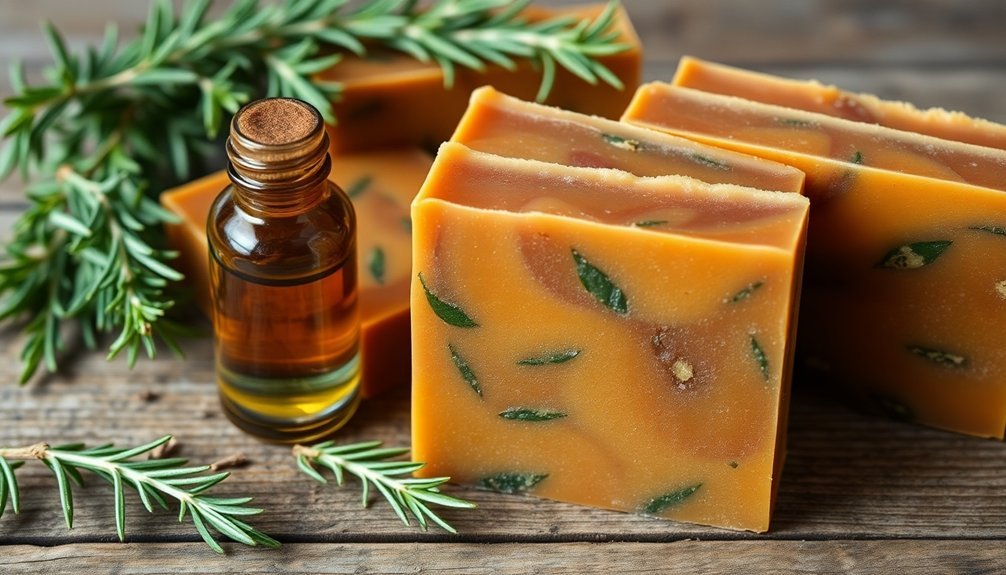
When soap makers seek natural protection for their handcrafted creations, Rosemary Oleoresin Extract (ROE) stands out as the gold standard. With 7% carnosic acid content, this powerful natural antioxidant effectively prevents oxidation in your cold process soap, particularly in olive oils prone to rancidity.
To extend shelf life and prevent DOS (Dreaded Orange Spots), add ROE at just 0.02%-0.05% per pound of base oils. This minimal amount provides maximum protection while maintaining your soap's quality.
Remember, ROE isn't a complete preservative—it won't stop mold or fungal growth. However, it excels at preventing oil oxidation and browning.
Store your ROE in an airtight container at room temperature and use within a year to guarantee it remains effective for all your soap making needs.
Tocopherol (Vitamin E): The Classic Oxidation Fighter
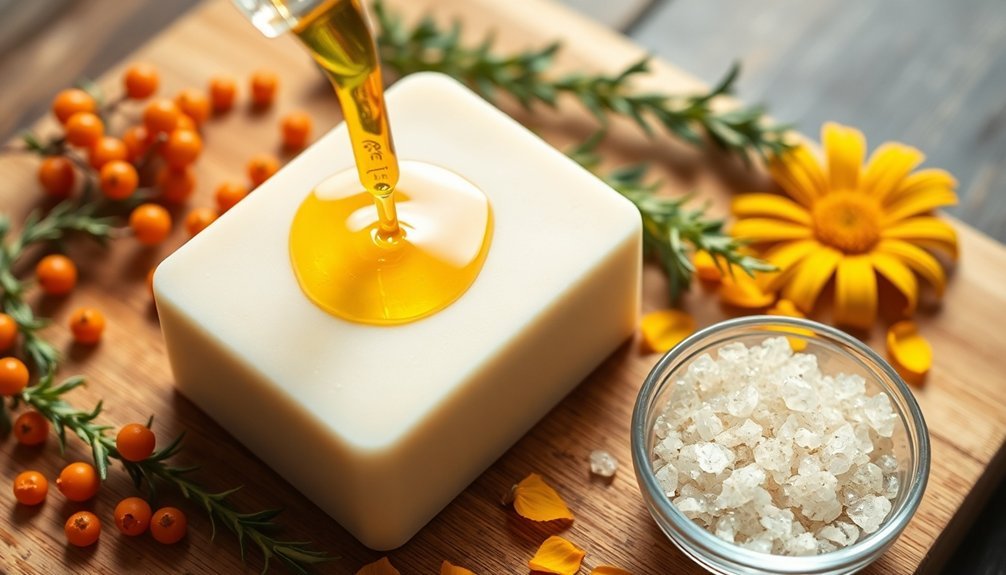
A staple in the soap maker's arsenal, tocopherol (Vitamin E) has earned its reputation as a powerful defender against oxidation in cold process soap.
This natural antioxidant effectively neutralizes free radicals, preventing rancidity and helping extend your soap's shelf life considerably.
For ideal results in your formulations, add Vitamin E at 0.5%-1% of your total oils weight.
You'll notice it doesn't just preserve—it enhances your soap's skin benefits too, improving hydration and reducing the appearance of scars.
- Protects precious oils from going rancid in balms, creams, and soaps
- Improves skin appearance while extending product life
- Works as an antioxidant but isn't a preservative against microbial growth
Grapefruit Seed Extract: Citrus Power for Extended Shelf Life
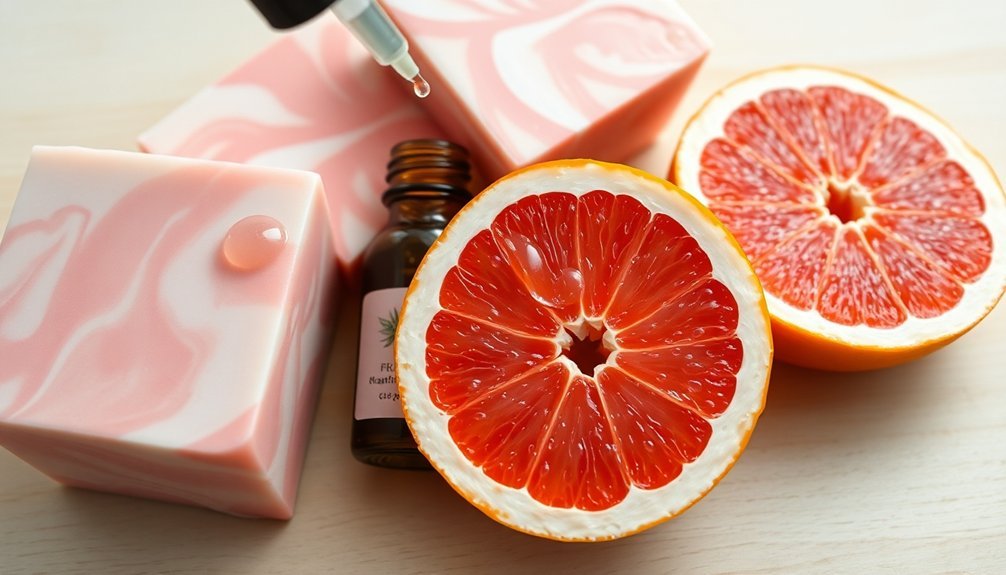
Packed with natural citrus power, Grapefruit Seed Extract (GSE) offers soap makers an exceptional option for extending product shelf life. This potent antioxidant, derived from grapefruit seeds and pulp, effectively inhibits bacterial and fungal growth in your cold process soap formulations.
Add GSE at 0.5% to 1% of your total oil weight to combat rancidity and maintain product integrity. Its high concentration of ascorbic acid and bioactive compounds makes it a compelling alternative to synthetic preservatives.
You'll appreciate how GSE enhances your soap's stability while meeting consumer demand for natural preservatives.
Remember to highlight GSE on your product labels—today's customers value transparency about the ingredients that keep their soaps fresh and effective longer.
BHT and BHA: Synthetic Options for Maximum Longevity
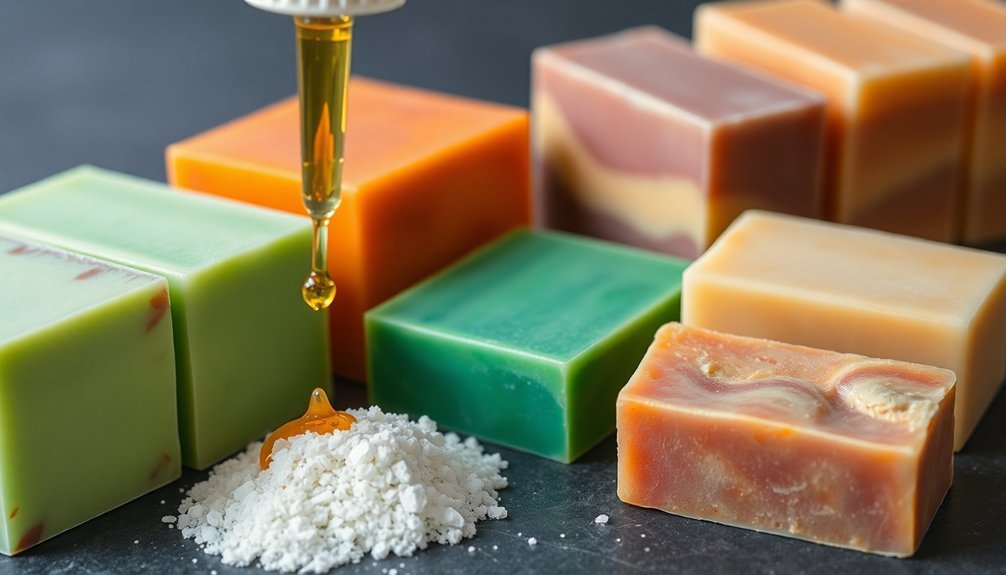
BHT and BHA offer your cold process soap exceptional longevity, though you'll need to weigh their synthetic nature against natural alternatives when considering your formulation goals.
You'll achieve ideal results by adding these potent antioxidants at just 0.01-0.1% of your total oil weight during the cool-down phase, as they can lose effectiveness when exposed to high temperatures.
While regulatory agencies have established these preservatives as safe within prescribed limits, your customers might prefer products without synthetic additives, making this an important formulation decision.
Benefits Versus Drawbacks
When considering synthetic antioxidants for cold process soap, you'll find few options as potent as BHT and BHA for extending product shelf life. These powerful synthetics effectively block free radicals and prevent rancidity in your soap creations, outperforming natural alternatives like rosemary extract in longevity tests.
However, you'll need to weigh these benefits against significant drawbacks:
- Potential health risks including endocrine disruption demonstrated in animal studies
- Reduced marketability as consumers increasingly demand natural, clean ingredients
- Regulatory limitations in international markets, particularly in the European Union
While BHT and BHA provide superior antioxidant protection for cold process soap, their synthetic nature may conflict with your brand positioning or customer expectations. Your final choice should balance effectiveness against these important considerations.
Usage Rates Explained
Two critical factors determine the effectiveness of synthetic antioxidants in your cold process soap: proper dosage and timing of addition.
For maximum protection, add BHT at 0.01% to 0.1% of your total formulation weight to extend the life of your soap by preventing oil deterioration. Similarly, BHA works effectively at 0.02% to 0.1%, interrupting the free radical chain reactions that cause rancidity.
Always incorporate these synthetic antioxidants into your oils before adding lye. While they offer superior preservation capabilities, remember that regulations require proper labeling.
Some customers may have skin sensitivity concerns related to BHT and BHA, so transparent disclosure on your packaging is essential. These precise usage rates guarantee you'll gain all the preservation benefits while minimizing potential drawbacks in your soap formulations.
Heat Sensitivity Factors
Understanding how temperature affects your synthetic antioxidants can greatly impact their performance in cold process soap. BHT and BHA are particularly valuable when you're working with heat-sensitive oils, as they help extend shelf life even when exposed to temperature fluctuations during processing.
- BHT remains stable up to 265°F, making it ideal for preventing oil rancidity when your soap reaches gel phase temperatures.
- BHA offers similar protection at lower concentrations (0.01-0.1%), helping preserve skin-beneficial properties in your formulations.
- Both synthetic antioxidants outperform many natural alternatives when subjected to repeated heating cycles.
While using natural antioxidants may appeal to certain markets, BHT and BHA provide superior protection against oxidation in challenging conditions.
Just remember to stay within recommended usage rates to balance preservation benefits with potential skin sensitivity concerns.
Green Tea Extract: Polyphenols That Preserve Soap Quality
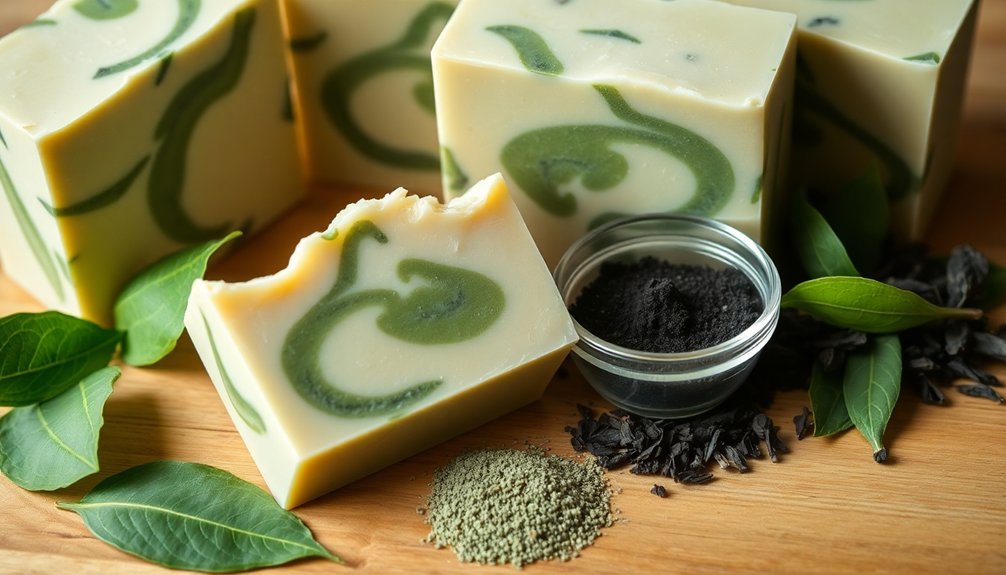
Among the most effective natural antioxidants, green tea extract stands out for its remarkable preservation properties in cold process soap.
Rich in polyphenols, particularly catechins, it actively fights oxidation that leads to rancidity in your soap oils.
You'll find that adding green tea extract at 0.5% to 2% of your total oil weight considerably extends your soap's shelf life while maintaining its color and fragrance.
These powerful antioxidants work by neutralizing free radicals that would otherwise degrade your soap quality over time.
For maximum effectiveness, consider pairing green tea extract with complementary antioxidants like rosemary oleoresin.
This combination not only preserves your soap but offers additional skin benefits, including reduced inflammation and improved skin health—making green tea extract a multifunctional addition to your soapmaking arsenal.
Citric Acid: The Versatile Antioxidant for Cold Process Soap
Your handcrafted soaps deserve protection from rancidity, which is where citric acid shines as a natural antioxidant powerhouse.
You'll find this versatile ingredient extends the shelf life of your cold process soaps by neutralizing free radicals and preventing oxidation of precious oils.
When combined with the bright, clean scent of citrus oils, citric acid creates a synergistic effect that not only preserves your soap but enhances its invigorating aromatic properties.
Preserving Fresh Soapy Goodness
While many soapmakers focus on fragrance and color, citric acid quietly works behind the scenes as your soap's protective guardian. Adding just 0.5-2% of this powerhouse to your lye solution helps extend shelf life by preventing rancidity. It binds with troublesome metal ions that would otherwise accelerate oxidation, maintaining your creation's original scent and appearance.
Citric acid isn't just about preservation—it's a multifunctional ingredient that improves:
- Oil stability throughout the curing process and beyond
- Skin feel, creating a more luxurious bathing experience
- Lather quality, producing the rich bubbles your customers crave
You'll appreciate how this versatile antioxidant protects your hard work while simultaneously enhancing performance.
When formulating your next batch, don't overlook this small but mighty addition that preserves your soap's fresh goodness.
Enhancing Citrus Powered Protection
Beyond its preservative qualities, citric acid serves as a powerhouse antioxidant that transforms your cold process soap into a long-lasting creation. When you add 1-5% citric acid to your formulation, you'll effectively neutralize oxidative stressors that cause rancidity.
| Benefit | Function | Usage Level |
|---|---|---|
| Extended shelf life | Chelates metal ions | 1-2% for basic protection |
| Prevents discoloration | Neutralizes oxidants | 2-3% for medium impact |
| Skin exfoliation | Adds texture benefit | 3-5% for enhanced effect |
You'll find citric acid particularly effective when paired with sodium lactate, creating a dynamic duo that improves both texture and longevity. This versatile ingredient doesn't just protect your soap—it enhances the final product by adding mild exfoliating properties that benefit your skin.
Proper Application Methods: Maximizing Antioxidant Effectiveness
Achieving ideal protection for your cold process soap requires careful attention to how you incorporate antioxidants into your formulation.
Add Rosemary Oleoresin Extract (ROE) at 0.02%-0.05% per pound of oils immediately after opening your oil containers. This process helps stabilize your oils against rancidity, extending your products' shelf life considerably.
- Mix the antioxidant thoroughly into your oils to guarantee even distribution—uneven application can compromise protection.
- Store your antioxidants in cool, dark, airtight containers and use within one year to maintain potency.
- Label your finished products accurately, noting all additives used for consumer transparency.
After adding antioxidants, always test your final soap for stability. This verification step guarantees your carefully crafted products maintain their quality throughout their intended shelf life.
Frequently Asked Questions
How Do You Increase the Longevity of Cold Process Soap?
You'll increase soap longevity by adding ROE or Vitamin E (0.02-0.05%), choosing oils with long shelf life, storing in cool dark places, and monitoring for rancidity. These steps prevent oxidation effectively.
What Makes Cold Process Soap Last Longer?
You'll make your cold process soap last longer by adding antioxidants like ROE and Vitamin E oil, using fresh high-quality oils, and storing your soaps in cool, dark places away from moisture and heat.
How to Increase the Shelf Life of Soap?
You'll extend soap shelf life by adding natural antioxidants like Rosemary Extract (0.02-0.05%) or Vitamin E oil. Store oils properly, use fresh ingredients, and include antioxidant-rich oils like grapeseed in your formulation.
How Do You Make Fragrance Last Longer in Cold Process Soap?
To make fragrance last longer in cold process soap, you'll need to use scent fixatives like clay, add essential oils at 3% by weight, incorporate natural sugars, avoid overheating, and choose soap-specific fragrance oils.
In Summary
You've now discovered seven powerful antioxidants to extend your soap's shelf life. Whether you prefer natural options like rosemary extract and vitamin E or synthetic alternatives like BHT, you'll find solutions that work for your formulations. Remember to add these preservatives at the correct temperature and concentration. With these antioxidants in your soapmaking toolkit, you'll create products that maintain their quality and freshness much longer.
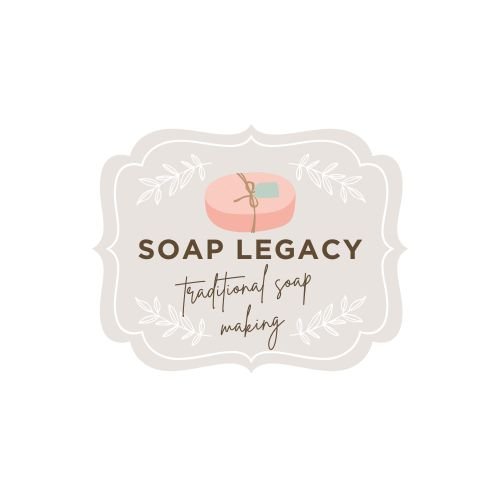

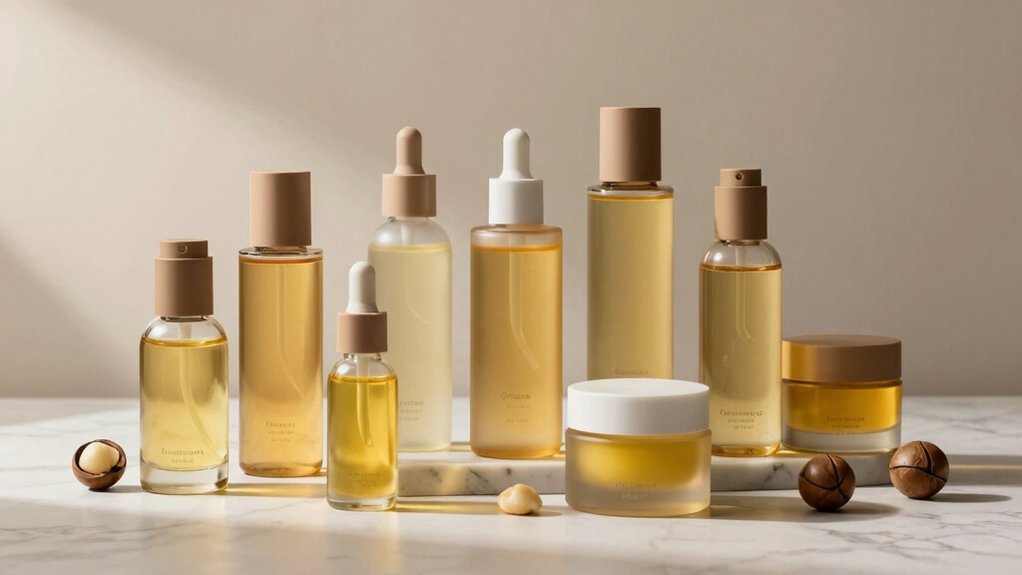
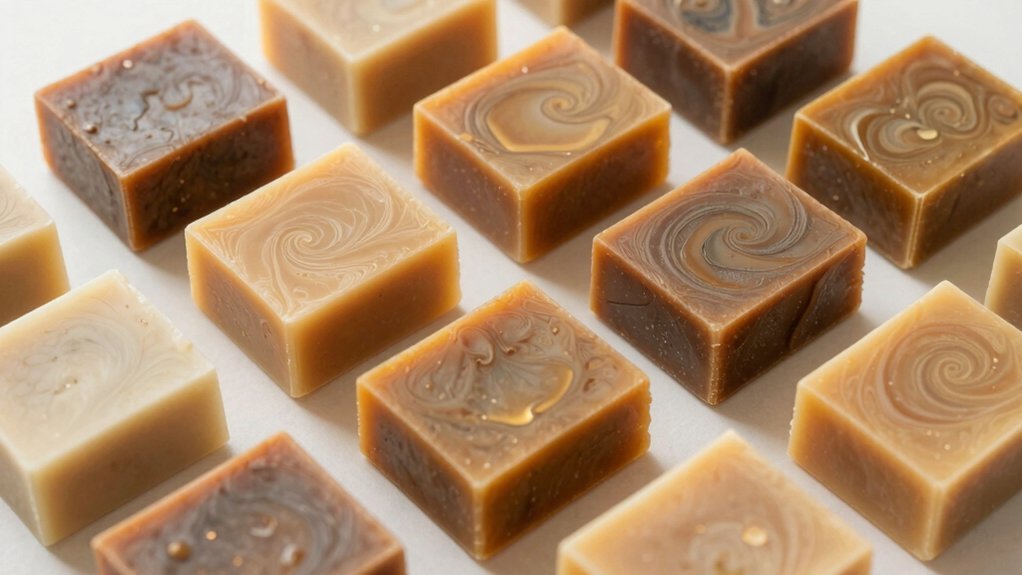
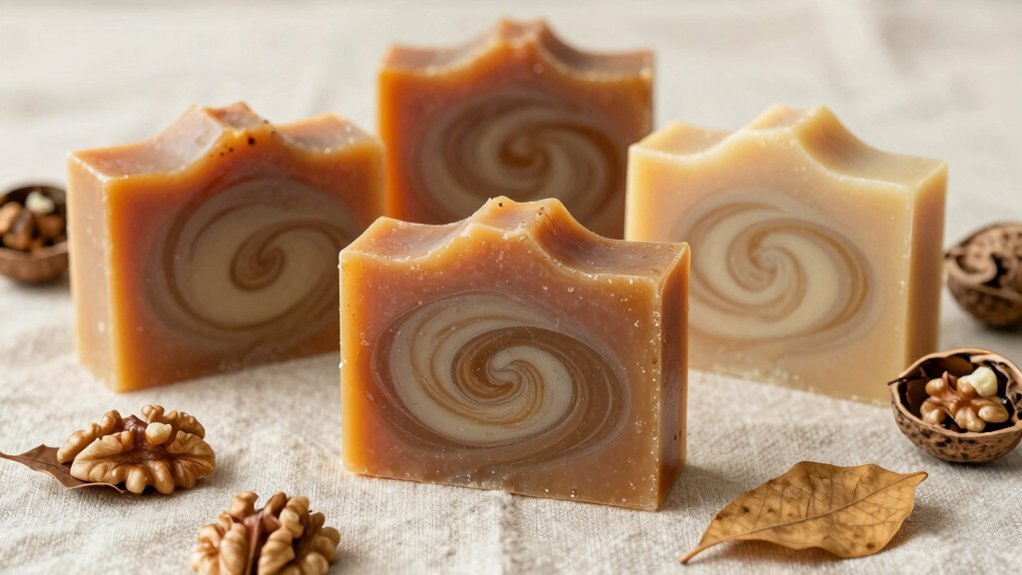
Leave a Reply